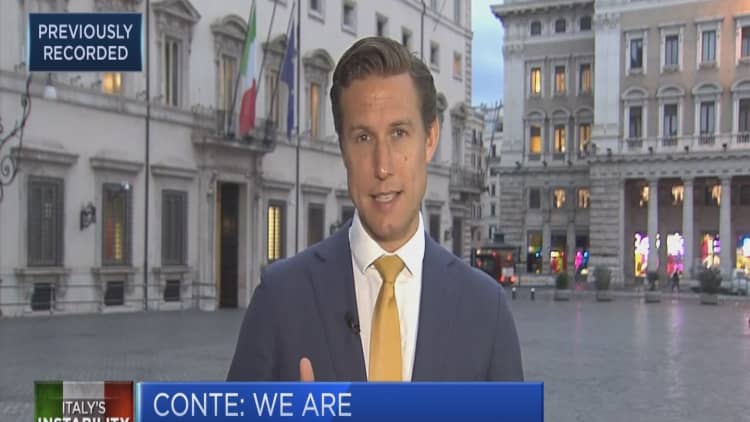Italy's political masters say they're "extremely happy" with their expansionary budget plans for next year. Now, the onus is on Brussels over whether to accept or reject the new spending proposals.
Deputy Prime Minister Matteo Salvini, who also heads the right-wing Lega party, said his lawmakers were keeping their promises to voters after the Cabinet approved the draft budget — which essentially increases social spending and lowers the retirement age.
"I am extremely happy, we are keeping our promises, slowly but bravely. We are dismantling the previous pension law, giving back the right to work at 400,000 Italians (young people able to pick up the jobs vacated by older people who could retire earlier). We are not raising taxes of any kind for 2019," Salvini said during a press conference Monday evening.
Italy's budget, which was submitted to the European Commission Monday ahead of a midnight deadline, includes controversial measures that were promised by the anti-immigration Lega party and anti-establishment Five Star Movement (M5S) ahead of the last general election in March. The vote delivered an inconclusive result and the parties formed a coalition, one that has since caused consternation in Brussels for its euroskeptic rhetoric and big spending plans.

The coalition's 2019 budget includes plans to boost welfare spending and cut some taxes essentially. It rows back on unpopular pension reforms, made in 2011, that raised the retirement age and aims to introduce a basic income for the poor.
European Commission officials have expressed dismay and frustration at Italy's rebellious stance over spending but the coalition is largely unrepentant about its plans, throwing down the gauntlet to Brussels.
Prime Minister Giuseppe Conte, who was elected to the post by Salvini and his coalition partner, M5S leader Luigi Di Maio, echoed Salvini's comments that the coalition was sticking to its pledges.
"We are keeping all our promises, we are very happy with this budget," Conte told reporters Monday evening.
"This is the outcome of a lot of work and a lot of meetings that we have transparently made public. We have worked on a project, more than on a budget, we have worked on a project that the country needs, that citizens need. And, best of all, we are keeping the accounts in order, and delivering on our promises at the same time."
Number crunching
The government will aim for a budget deficit of 2.4 percent in 2019 and while that's within the European Commission's rules for budget deficits not to exceed 3 percent of GDP (gross domestic product), it is a higher amount than the government previously promised, of 0.8 percent.
Increased spending also breaks EU rules that say indebted nations like Italy should work toward a balanced budget. Italy's budget puts its economy minister, Giovanni Tria — seen as a moderate influence in the coalition — in a difficult position as he has pushed for lower spending but was overruled by the coalition leadership.
Crucially, the budget relies on some assumptions that the Italian government has made over higher growth and lower borrowing costs. One of the key forecasts in the budget is that Italy's high debt to GDP ratio, of around 130 percent now, will decline to 126.7 percent of GDP in 2021.
The European Commission will now assess the budget and could accept or reject it, asking the coalition to amend its plans. We could know within the week what Europe thinks.
Thanos Vamvakidis, head of G-10 FX strategy at Bank of America Merrill Lynch, told CNBC Tuesday that Italy was breaking the rules.
"We believe that this budget cannot possibly be accepted by the EU, it is a clear violation of the fiscal rules. The Italian government has shown some signs they're willing to compromise but they're still far apart and we need some more market discipline," Vamvakidis told CNBC's "Squawk Box Europe."
Alessandro Tentori, chief investment officer for Italy at Axa Investment Managers, told CNBC Tuesday that there was so far little detail in the budget about growth and investment projects.
"I think it will be very difficult for Economy Minister Tria or Minister Savona (Italy's minister for European affairs) to argue with Brussels that they are going to boost growth as they're projecting it. And I think this is where the country needs it most. Investment in Italy, as a percentage of GDP, in the last few years has been below EU average and has not really picked up from the crisis," he told CNBC's "Capital Connection."


